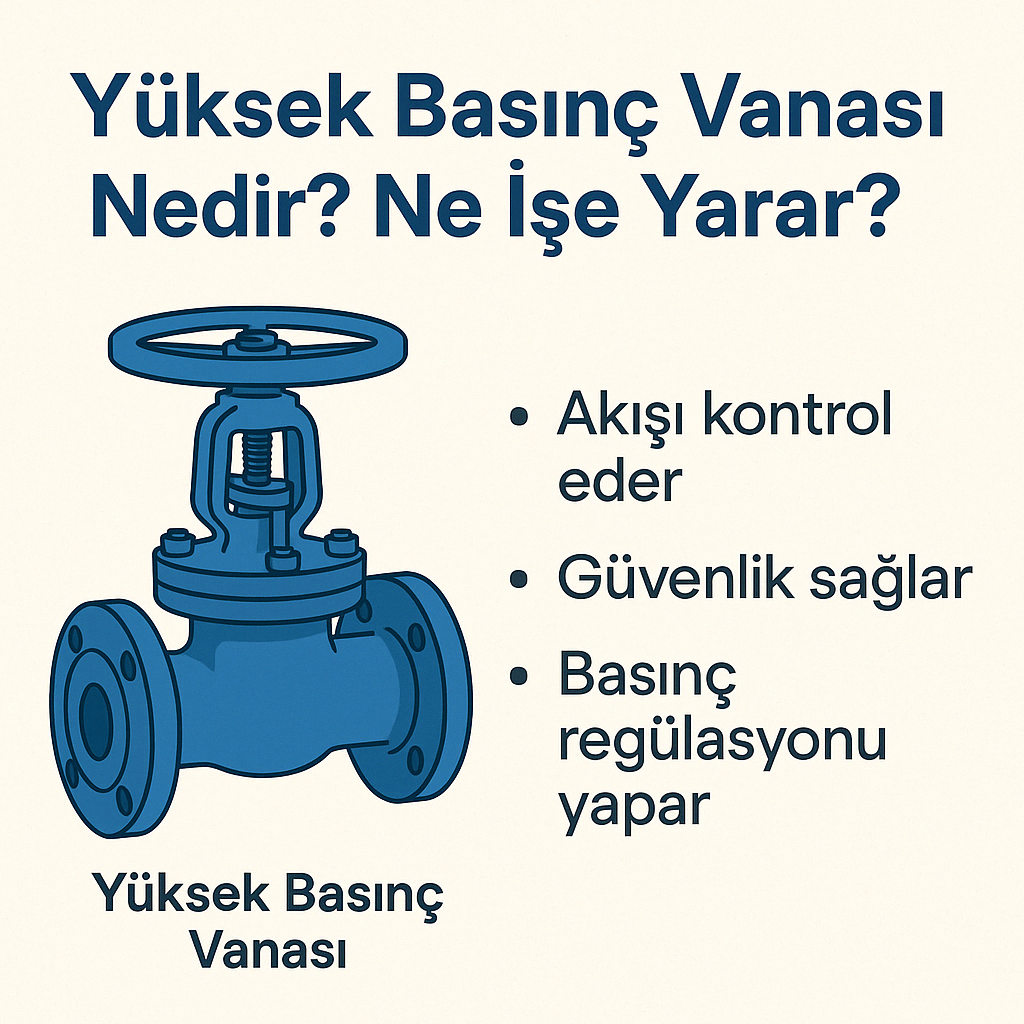Controlling and directing fluids in industrial plants is of great importance for system safety and efficiency. Especially in systems operating under high pressure, the durability and functionality of the equipment used becomes critical. At this point , high pressure valves play an indispensable role in terms of both flow control and safety. So, what is ahigh pressure valve, what does it do and in which areas is it used?
What is a High Pressure Valve?
High pressure valve is a type of industrial valve specially designed to withstand high pressure. These valves, which generally operate at pressure levels of 40 bar and above, manage liquid, gas or vapour flow in a safe and controlled manner. These valves differ from standard valves in terms of body structure, gasket systems and material quality.
High Pressure Valve Technical Specifications
| Feature | Details |
|---|---|
| Materials | Steel, Stainless Steel, Monel, Hastelloy, Duplex, Super Duplex |
| Connection Type | Flanged, Welded |
| Drive Unit | Manual, Electric, Pneumatic, Hydraulic |
| Operating Temperature | °C – +550 °C |
| Nominal Diameter (DN) | DN15 – DN2200 |
| Rated Pressure (PN) | PN10 – PN630 |
| Valve Types | Check, Gate, Globe, Check Valve, Ball, Butterfly, Plug, DB&B, Orbit, Choke, etc… |
High pressure valves are generally manufactured from the following materials:
- Stainless steel (Stainless Steel)
- Alloy steel (Alloy Steel)
- Cast iron (Cast Iron)
- Brass or bronze (especially in low diameter systems)
These materials offer both chemical resistance and resistance to high temperature and pressure.
What doesa high pressure valve do?
1. Fluid Control
High pressure valves can completely stop, start or restrict the flow in lines through which fluids (water, gas, steam, oil, etc.) pass. This allows the system to operate as desired.
2. Provides Security
In systems operating under high pressure , sudden pressure spikes can cause serious damage. Such valves provide a controlled release or diversion of pressure , minimizing the risk of explosion or system collapse.
3. Pressure equalization
Some special types of valves (e.g. pressure regulating valves) increase process stability by keeping the pressure in the system constant at a certain level. This is especially critical to prevent damage to sensitive equipment.
4. ImprovesEnergy Efficiency
A correctly selected and installed high pressure valve ensures more efficient operation of the system. Energy savings are achieved by preventing fluid losses and pressure fluctuations.
Application Areas of High Pressure Valves
High pressure valves are used in a very wide range of applications. The most common areas of use are:
- Oil and gas pipelines
are used for the safe transmission ofhigh pressure gases and liquids. - Chemical and petrochemical plants
It is preferred for safety purposes in systems working with reactive substances. - Power plants
It plays a critical role in systems exposed to high temperature and pressure , such assteam lines, turbine feeds and water circuits. - Hydraulic and pneumatic systems
Used to direct fluids inhigh pressure machines. - Food and pharmaceutical industry
It plays an important role in terms of product safety in hygienic and high pressure resistant systems. - Fire extinguishing systems
Provides safe flow in high pressure water lines forfast and effective response.
Types ofHigh Pressure Valves
Different types of high pressure valves are available according to the intended use and system structure:
- Ball (Ball) Valve: Providesfast opening and closing, high sealing rate.
- Needle Valve: Ideal for precise flow rate adjustment.
- Compact High Pressure Valves: Used where space saving is required.
- Pressure Reducing Valve: Reduces overpressure and stabilizes it.
- Safety Valves: Prevents damage to the system in case of emergency.
Why Choosing the Right Valve is Important?
Choosing the wrong valve in a high-pressure system can lead not only to loss of performance but also to serious safety risks. Therefore, the main criteria to be considered when choosing a valve:
- Pressure and temperature range
- Type of fluid (chemical structure, viscosity, etc.)
- Connection shape and diameter
- Sealing properties
- Mounting location and ease of maintenance
Frequently Asked Questions (FAQ)
How many bars dohigh pressure valves withstand?
High pressure valves are generally manufactured to withstand pressures between 40 bar and 1000 bar. However, higher values can be achieved with special production valves according to system requirements.
Which valve type is safer at high pressure?
Ball valves and needle valves are widely preferred in high pressure systems. Both offer high tightness, but the choice should be made according to the application area.
Dohigh pressure valves leak?
A high-pressure valve made of quality materials and installed correctly passes leak tightness tests and does not leak. Leakage can occur over time as the seals wear out; therefore regular maintenance is important.
Can standard valves be used in high pressure systems?
No. Standard valves are not designed to withstand high pressure and can cause serious problems such as deformation, cracking or leakage.
Evaluation
High pressure valves are essential equipment for safe, efficient and long-lasting operation in high pressure systems. These valves not only control flow, but also protect the system against overpressure and increase energy efficiency. Choosing the right valve type and material is crucial for the safety and continuity of the process.
Getting professional support in selecting and installing the right high pressure valve for the needs of industrial systems is a critical step towards long-term success and safety.

